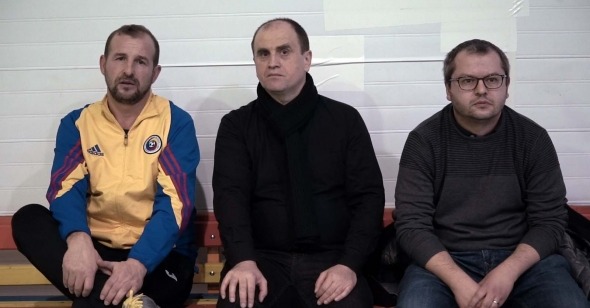Goal Oriented
by Jeff Reichert
Infinite Football
Dir. Corneliu Porumboiu, Romania, Grasshopper Film
In Corneliu Porumboiu’s films, seemingly insignificant details, questions, and disagreements ripple outward, like pebbles tossed into a still pond, until they become deep inquiries into history, language, and ethics. His first film, 12:08 East of Bucharest, hinged on the question of whether the residents of a small Romanian village situated somewhat east of Bucharest joined the burgeoning revolution against Ceauşescu before or after 12:08, the moment at which the dictator resigned. Did the rebels hit the streets prior to that fateful moment, thus marking them as local heroes? Or was it directly after, suggesting that their act was less an open show of resistance than just a blind following of national trends?
Porumboiu’s latest, his second soccer-focused nonfiction work after The Second Game, Infinite Football focuses intently on a single subject, the director’s friend Laurențiu Ginghină, and yet continually moves outward to the realm of philosophy. The film opens at the side of a grim outdoor soccer field in winter, all concrete and rusted fencing, as Ginghină, a former soccer star relates to Poromboiu, who appears on camera throughout the film as a curious, chipmunk-cheeked interlocutor, how an accident on the pitch in 1987 led him to radically reimagine the world’s most popular sport.
On that day in 1987, Ginghină received the ball and proceeded upfield, and was immediately swarmed by members of the opposing team. A routine tackle resulted in a fractured fibula, which brought an abrupt end to his soccer career. It healed poorly, which led to him later fracturing his tibia while working in a machine shop, before walking several miles home on a broken leg. Through the brief film’s handful of scenes, Porumboiu’s simple two-camera setups wait and watch as Ginghină, a committed, compelling storyteller, reveals his life story, while the director, at least for the film’s first half, allows his subject room to wander and digress at will.
What most obsesses Ginghină is his belief that the injury, which we infer changed the course of his life, could have been prevented by a few uncomplicated alterations to the rules of the game. A lengthy scene places Porumboiu and Ginghină on opposite sides of a magnetic white board bedecked with colored pieces representing soccer players fit into the outline of a standard field. For Ginghină, soccer, with its current emphasis on players moving up and down the field, creates an inefficiency that slows the game and takes the focus away from what’s most important (the ball) and places it on the humans kicking it around. His proposition: if the sport limited certain groups of players to portions of the field, the ball could move more quickly between the goals, thus speeding the game up, and creating fewer chances for players to clump to the ball and lessen the risk of player injury.
Porumboiu’s film allows Ginghină the chance to try out his Soccer 2.0. A mid-film sequence on an indoor court provides Ginghină two teams, their coaches and referees all given a quick overview of the new rules. After the kickoff, there’s initial chaos—one team catches on to the advantages of the changed game patterns more quickly and exploits them (a metaphor in and of itself), but as the game settles deficiencies emerge. A debrief with the coaches sends Porumboiu and Ginghină back to the white board, but now the director, who had merely offered mild queries up to this point, seems frustrated and presses his friend about the point of his obsession. Could Ginghină just keep revising ad infinitum something that already mostly works? Yes, and he seems completely unbothered by this possibility. In fact, to him, it seems somewhat the point.
Prior to the match, we learned that Ginghină works as a low-level bureaucrat in a featureless office, the likes of which will be familiar to anyone who’s encountered the films of the Romanian New Wave. It’s unclear exactly what he does: an interaction with an elderly woman and her son concerns the return of a piece of property confiscated by the state during Communism, but it doesn’t seem that Ginghină has any power to help beyond referring the pair to another, more important municipal office. When the voice of an off-screen coworker sheepishly interrupts Ginghină’s interview to remind him of a pending appointment, the filmmaker tries to cut it short, but his subject just keeps on talking.
In the office interview, Porumboiu spends time learning about the might-have-beens of Ginghină’s life, which include potential careers in agriculture in the United States. One such job was derailed by heightened difficulties obtaining a visa after 9/11. Now balding, middle-aged, seemingly married (we see wedding photos, but never meet his wife), he has become obsessed with fixing soccer. At one point in the early aughts he even pitched his theories to various sponsors and agencies surrounding the sport. One imagines this wasn’t received well, as soccer hasn’t changed a whit.
Though Infinite Football casts a gently critical eye at its protagonist, it’s no dour portrait of a minor functionary seeking a fruitless outlet from circumscribed routine. Ginghină, like his beloved soccer ball, may be hemmed in, but he’s also alive, spirited, vibrating with potential energy. In the film’s closing movement, a lengthy, slow-motion tracking shot through a bluish, snowbound twilight, Porumboiu gives us access to his subject’s curious mind via a voiceover that ranges from soccer to Plato to the human condition. Loquacious Ginghină is the perfect star for a filmmaker who, so often throughout his career, has spun so much from so little. Infinite Football seems to suggest that, to stay sane, we might all try and do the same.
